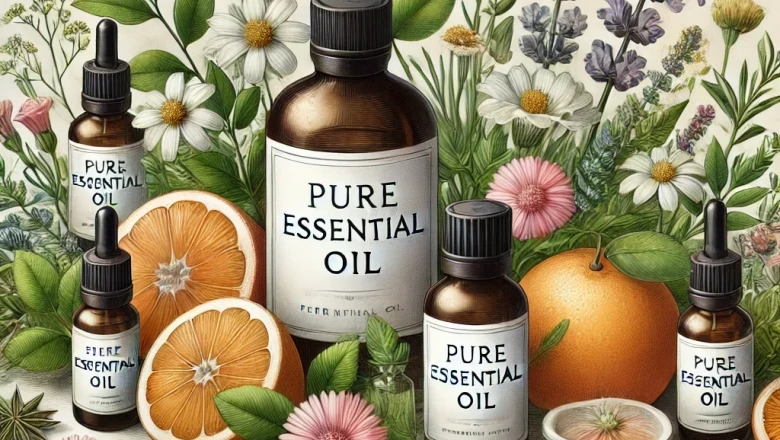views
Essential oils have been the basis of health practices for centuries, and they are known for their aromatic allure and therapeutic properties. From ancient Egyptian rituals to modern-day aromatherapy, these concentrated plant extracts are touted for their ability to calm the mind, heal the body, and invigorate the senses. But how do they work, and is there any scientific evidence to support their claims? To learn more about their potential benefits, let's dive into the science behind pure essential oils.
What Are Pure Essential Oils?
Essential oils are highly concentrated extracts derived from plants. They capture the plant's natural fragrance and therapeutic properties through methods like:
-
Steam Distillation: A standard method where steam passes through plant material to extract the oil.
-
Cold Pressing: This method is mainly used for citrus fruits, where the oil is extracted mechanically from the peel.
-
Solvent Extraction: Utilized for delicate flowers like jasmine, which cannot endure the heat of distillation.
Pure essential oils differ from synthetic fragrances as they retain the plant's natural chemical compounds, which are believed to contribute to their healing effects.
The Science Behind How Essential Oils Work
Essential oils work primarily through two pathways: inhalation and topical application.
1. Inhalation
When you inhale essential oils, aromatic molecules interact with the olfactory system in your nose. This system is directly linked to the brain, particularly the limbic system, which controls emotions, memories, and arousal.
-
Impact on Mood: Essential oils like lavender are shown to reduce anxiety by influencing neurotransmitters such as serotonin and dopamine.
-
Memory Triggers: Scents can evoke vivid memories or feelings, making aromatherapy beneficial for emotional well-being.
2. Topical Application
Essential oils penetrate the epidermis and interact with underlying tissues when applied to the skin.
-
Skin Absorption: Essential oils are lipophilic, meaning they can easily blend with skin oils and enter the bloodstream.
-
Localized Effects: Oils like tea tree and eucalyptus have antimicrobial properties, effectively treating skin conditions and infections.
Do Essential Oils Work? The Evidence
1. Stress and Anxiety Relief
-
Scientific Backing: A 2015 study published in Complementary Therapies in Medicine found that inhaling lavender essential oil reduced anxiety levels in pre-surgery patients.
-
How It Works: Lavender and bergamot essential oils interact with GABA receptors in the brain, promoting a calming effect.
2. Pain Management
-
Essential Oils Used: Peppermint and eucalyptus oils are famous for relieving headaches and muscle pain.
-
Evidence: Research indicates that menthol, a compound in peppermint oil, acts as a counter-irritant, reducing pain perception.
3. Antimicrobial Effects
-
Powerful Oils: Tea tree, oregano, and thyme oils are known for their antibacterial and antifungal properties.
-
Scientific Proof: Studies have shown tea tree oil to be effective against Staphylococcus aureus and Candida albicans, common pathogens responsible for skin infections.
4. Sleep Improvement
-
Relaxing Oils: Lavender and chamomile oils are widely used to promote restful sleep.
-
Clinical Trials: A 2020 meta-analysis revealed that lavender oil improved sleep quality in individuals with insomnia.
5. Skin Health
-
Oils for Skincare: Rosehip and frankincense oils are praised for reducing inflammation and promoting skin regeneration.
-
Research Insights: These oils contain antioxidants and anti-inflammatory compounds that may help treat conditions like acne, eczema, and ageing skin.
How to Use Essential Oils Safely
Despite their benefits, essential oils must be used with caution. Here are some tips to ensure safe usage:
-
Dilution: Always dilute essential oils with a carrier oil like coconut or jojoba before applying them to your skin.
-
Patch Test: Perform a patch test to check for allergic reactions.
-
Avoid Ingestion: Only ingest essential oils under the guidance of a qualified practitioner.
-
Proper Storage: Store oils in a cool, dark place to preserve their potency.
Common Myths About Essential Oils
Myth 1: Essential Oils Are a Cure-All
While essential oils can support wellness, they do not replace medical treatments.
Myth 2: Pure Oils Never Cause Side Effects
Even pure oils can cause irritation or allergies if misused. Quality matters, but so does proper usage.
Myth 3: More Is Better
Overuse of essential oils can lead to adverse effects like headaches or respiratory issues. A little goes a long way.
The Role of Quality in Effectiveness
The effectiveness of essential oils hinges on their purity. Adulterated oils mixed with synthetic compounds can reduce their efficacy and increase the risk of side effects. Look for oils that are:
-
Certified Therapeutic Grade
-
100% Pure and Natural
-
Free from Additives
The Future of Essential Oils in Medicine
The growing body of research on essential oils indicates their potential in complementary medicine. From managing stress to enhancing skincare, essential oils offer a natural way to support overall well-being. However, further studies are needed to establish standardized guidelines for their therapeutic use.
Conclusion
The science behind pure essential oils reveals a fascinating interconnection between nature and human health. While they may not be a panacea, their ability to influence the mind and body is well documented. Whether you want to promote relaxation, pain relief or skin care, essential oils can be a valuable addition to your health routine - when used mindfully.
Incorporating pure essential oils into your lifestyle isn't just about enjoying their aroma; it's about harnessing their therapeutic potential to live a healthier, more balanced life.






















Comments
0 comment